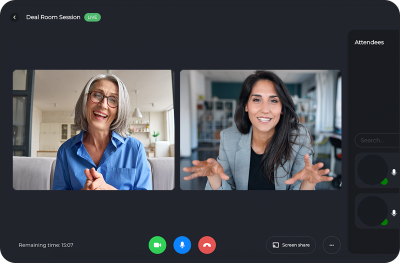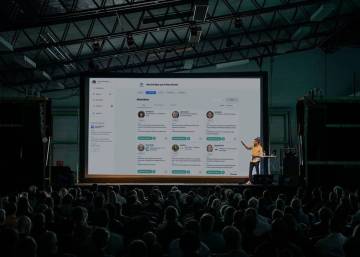With companies shifting globally towards remote work, people are used to consuming content virtually. Online courses and video calls have become the obvious pattern. However, setting up a virtual event on an online event platform is a different experience than scheduling a video call, requiring more preparation.
So, where do you start?
-
Think about the goals of the event and the KPIs
-
Get to know your target persona
-
Decide on the event type
-
Choose the right software
-
Create content
-
Monetize your event
-
Promote your event
Think about the goals of the virtual event and the KPIs.
Answer the following questions: Why are you organizing this event? What do you want to achieve from the business perspective?
-
Acquire new leads
-
Build the awareness of the product or service
-
Community networking
-
Position your brand
Why do the attendees want to come to your event?
-
To network
-
To learn
-
To be inspired
-
To be entertained
How will you measure the success of your event? Name specific metrics.
-
Number of participants
-
Sponsors’ success (new leads or customers acquired through the event)
-
Attendee engagement (number of meetings booked, number of visits to virtual booths)
-
Engagement on social media (number of retweets, shares, comments)
-
Event cost
Get to know your target persona.
Try to think broader than the traditional demographic data of your audience. What kind of people are they? Find out more personalized characteristics than age and job title.
-
Do they enjoy the international environment?
-
What is their favorite social media channel?
-
What image of themselves do they want to create?
-
Are they tech-savvy?
Try to build an event environment that would help your target persona become a better version of themselves.
What are the types and formats of virtual events? Define the right one for your event.
Depending on what you defined as the main focus for the attendees in step 2, pick an event type that suits their needs.
-
Conference: This type of event suits a large group of attendees with different online formats. Participants can have virtual rooms, meetings, breakout sessions, and interactive opportunities within the online event platform.
-
Webinar. Webinars can consist of pre-recorded or live content, videos, and presentations. Participants can interact with each other and speakers by using chat or Q&A.
There are many remote event formats that you can use for any setting:
-
Live stream. Usually described as one-way communication, a live stream can be a pre-recorded presentation, a video, or a speech from one or multiple speakers. The audience is usually passive, and they can interact with the panelists only via chat.
-
Q&A session. This is an interactive type of session, where the participants can ask questions from the speakers. On Deal Room, participants can join an interactive session with video and audio. Sometimes also called a roundtable, these sessions are good to include after the live stream, to let the participants discuss and ask questions.
-
Matchmaking. The online event is a great way to find a community with similar interests and experiences. The matchmaking format facilitates networking and engages attendees to communicate. On Deal Room, networking happens mainly via 1-1 meetings. Participants can book meetings with each other and add up to 8 people to their room. Thanks to the matchmaking algorithm, attendees can save time and meet only with the most relevant people.
Choose the right software.
If you’re aiming for a webinar with a classic speaker-audience setup, then Zoom can be a great option that comes with a few interactive opportunities.
However, if you want to build a more complicated environment with various interactive opportunities, you might want to consider a single virtual event platform. Such a platform can manage multiple formats simultaneously - keynotes, breakout rooms, 1-1 meetings, virtual booths, etc.
Remember to think mobile.
Many attendees don’t have the flexibility to join from desktop, and their experience with the platform on mobile should be just as smooth.
Deal Room can offer that and many other customizable features, along with a Customer Success Manager who can guide you through the event setup process. With our extensive expertise in the event industry, we can recommend the optimal session duration, sharp title and description for the sessions, and organize the rehearsals of your event.
Create content.
Create event-specific visuals - such as event logos and banners. They should be in line with your company’s brand - for example, have similar colors and graphics. This way, the participants would recognize the event as part of your brand and have a consistent experience.
We recommend having a moderator at the event - it reminds us of the physical event’s structure and helps make the attendees more engaged. Somebody who opens the sessions, pops up during breaks, and briefly explains how to use the digital event platform can make the participants feel less isolated.
Get busy looking for speakers! Create a perfect speaker list that your audience would love — research what unique insights they can bring to your event. Approach them with a short pitch on why they are your dream speakers. Prep them with your technician to ensure a smooth speaker experience on the online event platform.






